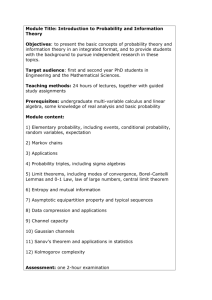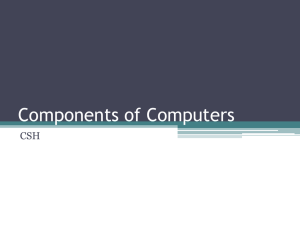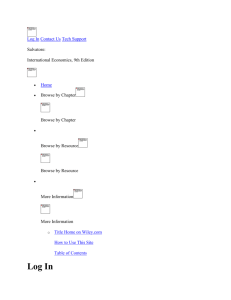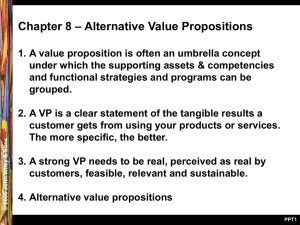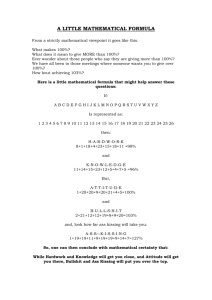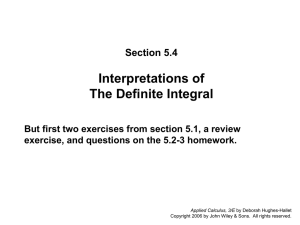ECG731 - Theoretical Techniques in Electromagnetics
advertisement
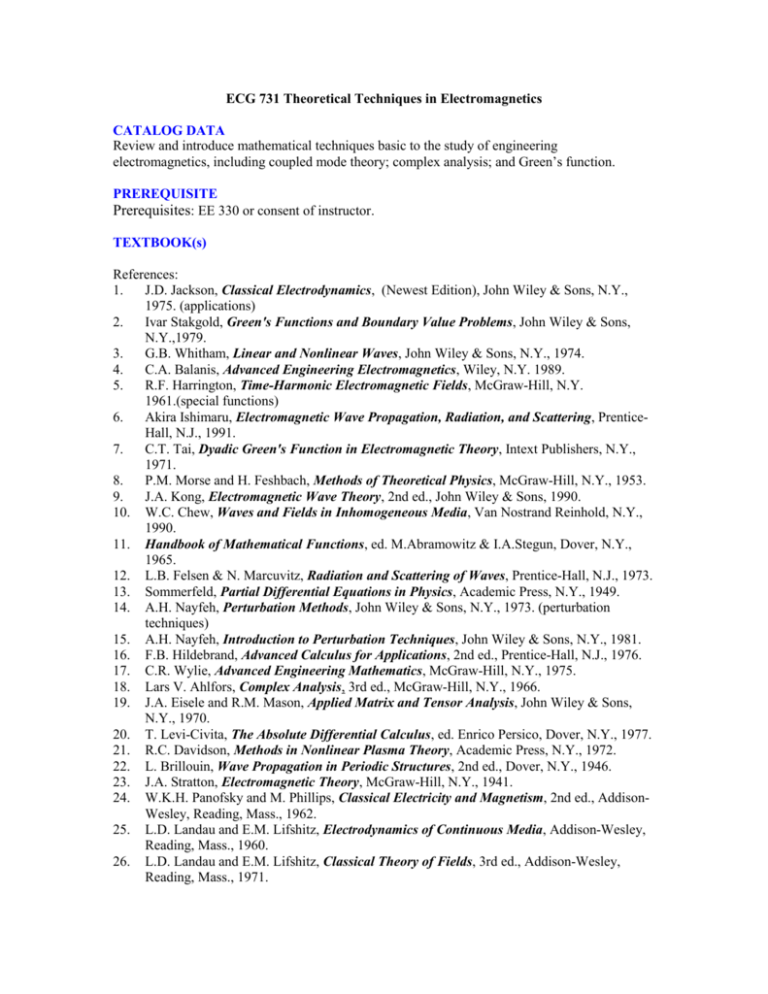
ECG 731 Theoretical Techniques in Electromagnetics CATALOG DATA Review and introduce mathematical techniques basic to the study of engineering electromagnetics, including coupled mode theory; complex analysis; and Green’s function. PREREQUISITE Prerequisites: EE 330 or consent of instructor. TEXTBOOK(s) References: 1. J.D. Jackson, Classical Electrodynamics, (Newest Edition), John Wiley & Sons, N.Y., 1975. (applications) 2. Ivar Stakgold, Green's Functions and Boundary Value Problems, John Wiley & Sons, N.Y.,1979. 3. G.B. Whitham, Linear and Nonlinear Waves, John Wiley & Sons, N.Y., 1974. 4. C.A. Balanis, Advanced Engineering Electromagnetics, Wiley, N.Y. 1989. 5. R.F. Harrington, Time-Harmonic Electromagnetic Fields, McGraw-Hill, N.Y. 1961.(special functions) 6. Akira Ishimaru, Electromagnetic Wave Propagation, Radiation, and Scattering, PrenticeHall, N.J., 1991. 7. C.T. Tai, Dyadic Green's Function in Electromagnetic Theory, Intext Publishers, N.Y., 1971. 8. P.M. Morse and H. Feshbach, Methods of Theoretical Physics, McGraw-Hill, N.Y., 1953. 9. J.A. Kong, Electromagnetic Wave Theory, 2nd ed., John Wiley & Sons, 1990. 10. W.C. Chew, Waves and Fields in Inhomogeneous Media, Van Nostrand Reinhold, N.Y., 1990. 11. Handbook of Mathematical Functions, ed. M.Abramowitz & I.A.Stegun, Dover, N.Y., 1965. 12. L.B. Felsen & N. Marcuvitz, Radiation and Scattering of Waves, Prentice-Hall, N.J., 1973. 13. Sommerfeld, Partial Differential Equations in Physics, Academic Press, N.Y., 1949. 14. A.H. Nayfeh, Perturbation Methods, John Wiley & Sons, N.Y., 1973. (perturbation techniques) 15. A.H. Nayfeh, Introduction to Perturbation Techniques, John Wiley & Sons, N.Y., 1981. 16. F.B. Hildebrand, Advanced Calculus for Applications, 2nd ed., Prentice-Hall, N.J., 1976. 17. C.R. Wylie, Advanced Engineering Mathematics, McGraw-Hill, N.Y., 1975. 18. Lars V. Ahlfors, Complex Analysis, 3rd ed., McGraw-Hill, N.Y., 1966. 19. J.A. Eisele and R.M. Mason, Applied Matrix and Tensor Analysis, John Wiley & Sons, N.Y., 1970. 20. T. Levi-Civita, The Absolute Differential Calculus, ed. Enrico Persico, Dover, N.Y., 1977. 21. R.C. Davidson, Methods in Nonlinear Plasma Theory, Academic Press, N.Y., 1972. 22. L. Brillouin, Wave Propagation in Periodic Structures, 2nd ed., Dover, N.Y., 1946. 23. J.A. Stratton, Electromagnetic Theory, McGraw-Hill, N.Y., 1941. 24. W.K.H. Panofsky and M. Phillips, Classical Electricity and Magnetism, 2nd ed., AddisonWesley, Reading, Mass., 1962. 25. L.D. Landau and E.M. Lifshitz, Electrodynamics of Continuous Media, Addison-Wesley, Reading, Mass., 1960. 26. L.D. Landau and E.M. Lifshitz, Classical Theory of Fields, 3rd ed., Addison-Wesley, Reading, Mass., 1971. 27. 28. 29. 30. 31. 32. 33. 34. 35. 36. M.D.Greenberg, Application of Green's Functions in Science and Engineering, PrenticeHall, N.J. 1971. (Green’s functions and eigenfuction analysis) R. Collin, Field Theory of Guided Waves, 2 ed IEEE Press, 1991. (applications) J. Mathews and R.L. Walker, Mathematical Methods of Physics, Addison Wesley, 1964. (general text on upper level mathematical techniques) H. Hochstadt, The Functions of Mathematical Physics, Dover, 1986. N. Bleinstein and R. A. Handelsman, Asymptotic Expansions of Integrals, Dover, 1986. D. Menzel, Mathematical Physics, Dover, 1961. N.N. Lebedev, Special Functions and Their Applications, Dover, 1972. P. Moon and D.E. Spencer, Field Theory Handbook, 2nd ed., Springer-Verlag, 1988. I.N. Sneeddon, Mixed Boundary Value Problems in Potential Theory, Amsterdam NorthHolland Publ., NY, Wiley, 1966. M.R. Spiegel, Mathematical Handbook, Schaum Outline Series, Wiley, 1968(?). COORDINATOR (pls. list all faculty who have/would instruct this course) Professor Robert A. Schill, Jr. PREREQUISITE BY TOPIC 1. Engineering Electromagnetics I TOPICS* This course is designed to address in depth mathematical techniques of use in solving advanced electromagnetic problems. Particle and Beam Radiation Special Functions and Eleven Orthogonal Coordinate Systems Bessel functions, Legendre functions, Mathieu functions, Airy functions, Generalized Legendre function Eleven orthogonal coordinate systems Couple Mode Theory Floquet's theorem Guided waves along periodic structures Periodic layers Plane wave incident on a periodic structure Complex Analysis Theory Cauchy-Riemann equation Cauchy integral formula Cauchy residue theorem Analyticity, branch points and branch cuts Applications Antennas Kramer's Kronig Relation Scattering from Cylinder (Watson's Transform) Green’s Functions General theory Dirichlet, Neumann and mixed boundary conditions Sturm-Liouville problems Applications Transmission line theory Charge particle radiation Antennas in free space Integral Equations Improper Integrals Fredholm integral equation (first & second kind) Volterra integral equation Electric Field Integral Equation (EFIE) Magnetic Field Integral Equation (MFIE) Pocklington's integrodifferential equation Hallen's integral equation; Applications Scattering by complex objects Current distribution in finite diameter wires Perturbation Techniques Method of matched asymptotic expansion Method of multiple scales Application Weakly irregular waveguides Cavity material perturbations Saddle Point Tech. and Method of Stationary Phase Theory Method of steepest descent Application Radiation field solution Geometrical optics (excitation of waves in an inhomogeneous medium) Variation Techniques Theory Ritz Procedure Reaction Concept Applications Cavities, waveguides, and transmission through apertures Weakly Nonlinear Systems WKB Multiple scales COURSE OUTCOMES Upon completion of the course, students will be able to: Apply different advanced mathematical techniques to solve electromagnetic problems. Understand the validity and constraints behind the technique of choice. COMPUTER USAGE MATLAB minimal. GRADING Homework assignments; One midterm; One final exam. COURSE PREPARER AND DATE OF PREPARATION Robert A. Schill, Jr., Last update date November 14, 2012
